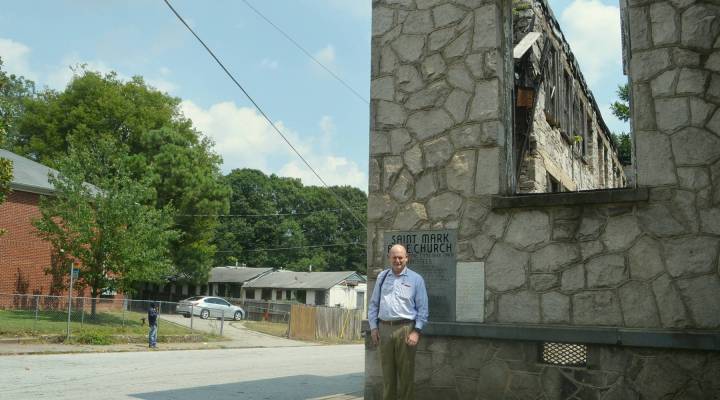
As neighborhoods gentrify, how do you help residents stay in place?
As neighborhoods gentrify, how do you help residents stay in place?

The English Avenue neighborhood on Atlanta’s Westside has struggled with crime and neglect for years. The street where John Ahmann stands is still dotted with vacant boarded-up houses. “When you look around here, you can see a lot of abandonment,” Ahmann said.
But Ahmann, who leads the Westside Future Fund, a nonprofit working to revitalize this neighborhood and the area around it, said change is coming.
A more than $1 billion football stadium was just built nearby for the Atlanta Falcons, and that project has sparked development plans for things like townhouses and parks.
But all of the new investment has also brought fear, Ahmann said. “The tragedy would be when that tide lifts, that the very residents who have been, in a way, suffering in these neighborhoods get pushed out,” he said.
So his nonprofit partnered with the city of Atlanta to create “an anti-displacement tax fund.” If homeowners’ property taxes go up, this fund, which has raised $5 million so far, will cover the increase for the next 20 years. It’s paid for by business leaders and philanthropists.
| If your neighborhood’s name changes, it’s probably being gentrified |
| Life as a millennial priced out of the housing market |
This has become a common approach for cities grappling with the effects of gentrification on neighborhoods. They roll out programs to protect homeowners from rising property taxes. “They’re often described as policies to prevent displacement of homeowners in areas where increasing investment is driving up the price of housing,” said Isaac Martin, a sociology professor at the University of California San Diego.
Martin said some communities cap how much property taxes can grow; others provide a rebate. But in a recent paper, he found these policies may not do that much. He said that’s “in part because the displacement of homeowners turns out to be a lot more rare than we thought.” Instead, Martin discovered the people at risk of displacement tend to be renters. He said they have less of a financial cushion.
And in Atlanta’s English Avenue, most residents do rent where they live. Leslie Canty, who’s leased a home here for nearly a decade, said he hasn’t heard any assurances yet. “I think it’s just this fear that, hey, we don’t know really what’s going to happen,” Canty said. Ahmann said his nonprofit and the city are looking for solutions for renters, too.
The program aimed at offsetting rising property taxes, which was a big concern of the community, he said, was just the first step. Meanwhile, the funds from that program will be available to homeowners starting next year.
There’s a lot happening in the world. Through it all, Marketplace is here for you.
You rely on Marketplace to break down the world’s events and tell you how it affects you in a fact-based, approachable way. We rely on your financial support to keep making that possible.
Your donation today powers the independent journalism that you rely on. For just $5/month, you can help sustain Marketplace so we can keep reporting on the things that matter to you.


















